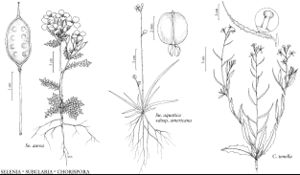Selenia
J. Acad. Nat. Sci. Philadelphia 5: 132, plate 6. 1825.
| Taxon | Illustrator ⠉ | |
|---|---|---|
 | Selenia aurea Subularia aquatica Subularia aquatica subsp. americana Chorispora tenella | Yevonn Wilson-Ramsey Yevonn Wilson-Ramsey Yevonn Wilson-Ramsey Yevonn Wilson-Ramsey |
Annuals (sometimes winter); not scapose; glabrous. Stems (rarely absent, base of plant forming inflated crown), erect, ascending, subdecumbent, or decumbent, unbranched or branched distally. Leaves basal and cauline; petiolate or subsessile; basal rosulate or not, petiolate, blade margins 1- or 2- (or 3-) pinnatisect, (terminal lobe margin entire or dentate); cauline sessile [subsessile], blade (base not auriculate), margins similar to basal. Racemes (sometimes pedicels originating between basal leaves, bracteate throughout, rachis straight), considerably elongated in fruit. Fruiting pedicels divaricate to ascending, slender. Flowers: sepals (sometimes persistent), erect, spreading, or ascending, (yellowish), oblong, oblong-linear or lanceolate, lateral pair slightly saccate basally; petals yellow, spatulate to broadly obovate, claw differentiated from blade, (apex rounded or emarginate [obtuse]); stamens tetradynamous; filaments not dilated basally; anthers linear, ovate, or oblong [sagittate]; nectar glands confluent (extending into spreading teeth). Fruits silicles, sessile or shortly stipitate, usually oblong, elliptical, suborbicular, or globose, rarely obovoid, smooth, latiseptate, terete, or slightly inflated; valves (vesicular in S. grandis, thin-papery to leathery), each without midvein, obscurely to prominently reticulate-veined; replum rounded or flattened; septum complete or perforated; ovules 8–44 per ovary; style distinct, (1–12 mm, sometimes flattened basally); stigma capitate. Seeds biseriate, flattened, winged throughout, orbicular; seed-coat (coarsely reticulate), not mucilaginous when wetted; cotyledons accumbent. x = 7, 12, 13.
Distribution
c, sw United States, ne Mexico
Discussion
Species 5 (4 in the flora).
Species of Selenia might be difficult to separate when the plants are only in flower. Selenia aurea is easily distinguished by its 1-pinnatisect leaves and absence of flowers from the base of the plant. The remaining three species have 2- or 3-pinnatisect leaves and at least some pedicels from the basal rosette. In S. jonesii, the sepal appendage is absent or less than 1 mm; in both S. dissecta and S. grandis, it is 1–4 mm. The last two can be distinguished in flower by the presence in S. grandis of terete styles and ovary margins (replum) and in S. dissecta by flattened style bases and winged ovary margins. Selenia mexicana Standley is endemic to Nuevo León, Mexico.
Selected References
Lower Taxa
Key
| 1 | Leaf blade margins 1-pinnatisect; fruiting pedicels from racemes; sepals with unappendaged apex. | Selenia aurea |
| 1 | Leaf blade margins 2- or 3-pinnatisect; fruiting pedicels (at least some) from basal leaf axils or rosettes; sepals with appendaged apex | > 2 |
| 2 | Fruit valves vesicular, leathery; sepals persistent; fruits 5.5-7.5 mm wide. | Selenia grandis |
| 2 | Fruit valves not vesicular, papery; sepals caducous or tardily so; fruits 8-17 mm wide | > 3 |
| 3 | Fruits oblong to elliptical, latiseptate; replums and styles flattened; petals (12-)15-20 × (5-)6-9 mm; ovules 28-40 per ovary; median filament pairs 6-10 mm; sepal apex appendage (1-)1.5-3 mm. | Selenia dissecta |
| 3 | Fruits usually globose, rarely obovoid, terete; replums and styles not flattened; petals 4-7 × 2.5-4 mm; ovules 8-14 per ovary; median filament pairs 3-4 mm; sepal apex appendage 0.5-0.8 mm. | Selenia jonesii |
"elongated" is not a number."thick" is not a number.